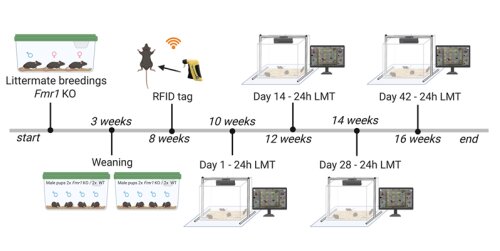LMT-MouseKing Platform
A game-changer in preclinical neuroscience: automated, scalable and ready to transform therapeutic screening.

Situation before
Developing therapies for rare neurodevelopmental diseases remains a major challenge in molecular medicine. While next-generation sequencing has uncovered hundreds of new genetic syndromes in recent years, progress in individualised treatments has lagged behind. Although each disorder is individually rare, together they affect over 300 million people worldwide and existing drug interventions frequently fail to translate promising preclinical findings into effective patient therapies.
However, the rise of Artificial Intelligence (AI) offers new possibilities. AI-driven algorithms can rapidly analyse large biomedical datasets, identifying drug candidates for rare diseases at an unprecedented pace. Start-ups and research groups are already leveraging this technology, generating numerous candidates for preclinical testing. Yet, this shift has created a new bottleneck, moving the challenge from drug discovery to testing. Traditional methods, like murine test batteries, are slow, expensive, and labor-intensive, highlighting the need for a scalable, standardised, and efficient solution.
Technology
To meet this demand, we have developed the LMT-MouseKing Platform. The platform comprises advances in development and validation of the Live Mouse Tracker (LMT) platform and our in-house MouseKing software.
The LMT system automates behavioural mouse phenotyping by extracting up to 40 traits from individual and group interactions. It has been adapted into a robust preclinical screening pipeline capable of continuously monitoring and analysing complex behaviours, including social interaction, anxiety-like responses, and activity patterns in groups of mice over 24-hour recording periods. By replacing subjective scoring with automated, continuous data collection, the platform can detect even subtle phenotypic changes. This enables rapid and standardised in vivo assessment of drug efficacy.
Complementing the LMT system, we have developed MouseKing, an in-house data analysis pipeline that processes and integrates the complex datasets produced by LMT. Together, LMT and MouseKing create the first universal platform capable of testing multiple drug candidates under identical and highly standardised conditions. This innovation reduces variability across experiments and laboratories, enabling direct comparisons of treatment efficacy.
Our initial focus is on fragile X syndrome (FXS), a well-characterised neurodevelopmental disorder that still lacks an approved treatment. The platform has since been extended to other neurodevelopmental disorders, such as Helsmoortel-Van der Aa syndrome, broadening its impact and applicability.
Partners we search for
The LMT-MouseKing Platform is open to collaboration with commercial and academic partners working in neurodevelopmental disorders and related fields. Pharmaceutical and biotech companies can use the platform to quickly screen lead compounds, reducing the cost and time needed to advance candidates toward clinical trials – with one of our mouse models or your own. AI-driven drug discovery companies can integrate our comprehensive, high-quality in vivo data to train and refine predictive models, accelerating the path from discovery to treatment. Our goal is to partner with organisations committed to transforming drug discovery for rare neurological disorders through innovative, data-driven approaches to discover effective patient therapies.
About the Team
The Kooy Lab (Cognitive Genetics Group, Center for Medical Genetics, University of Antwerp) has a long-standing track record of discovering and characterising genes involved in rare neurodevelopmental disorders, including fragile X syndrome. We have a modern, well-equipped laboratory, with the Fmr1 KO mouse colonies established in our animal facility and extensive expertise in mouse behavioural research. The Bittremieux Lab, part of the ADReM Data Lab in the Department of Computer Science at the University of Antwerp, focuses on the theoretical foundations and applied research of AI and data mining, working across disciplines and sectors. Our expertise in biomedical AI complements the behavioural phenotyping data from LMT-MouseKing. We are supported by the prestigious Methusalem center of excellence grant from the Flemish government, long-term funding from the FRAXA Research Foundation, and University of Antwerp IOF funding to promote translational and innovative research.
More information
University of Antwerp
Middelheimlaan 1
2020 Antwerp - Belgium